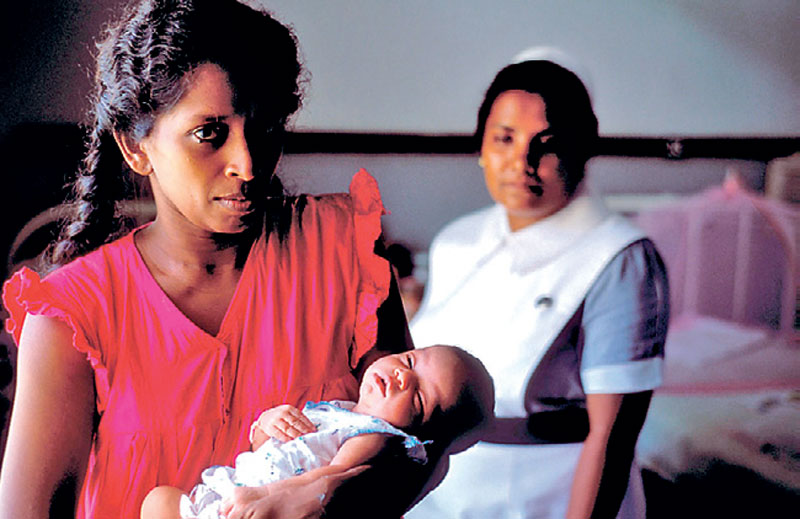Friday Feb 27, 2026
Friday Feb 27, 2026
Friday, 7 January 2022 00:46 - - {{hitsCtrl.values.hits}}

United Nations (New York): UNFPA launched its annual humanitarian report recently revealing a critical need to scale up assistance for crisis-affected populations. The organisation is appealing for $ 835 million to reach 54.5 million women, girls and young people in 61 countries with life-saving sexual and reproductive health services in 2022.
For the third year in a row, humanitarian funding needs are greatest in Yemen, where some $ 100 million is required for urgent support. Reproductive health services have been critically undermined by conflict and the COVID-19 pandemic; the most recent estimates hold that every two hours, a woman in Yemen dies in childbirth, and more than a million pregnant and breastfeeding women are acutely malnourished.
Dr. Samar, in the district of Jiah, sees women in life-threatening danger far too often, he said.
Not long ago, a woman named Safiya was carried by her husband to Dr. Samar’s clinic; she was in shock from an ectopic pregnancy.
“I told Safiya’s husband about the need for an urgent surgical intervention to save her life,” Dr. Samar recounted.
“His eyes were filled with tears, devastated, [he said] ‘I don’t have the money to hire a car to get to the hospital.”
The health centre doesn’t have an ambulance, and only recently resumed services after being forced to close for about a year due to lack of funding. Fortunately, with support from UNFPA, Dr. Samar was able to arrange for a car to take Safiya to the nearest hospital, some two hours away.
Vulnerability exacerbated
The country with the second greatest need for humanitarian funding for sexual and reproductive health services is Syria, the report shows.
There, $ 68.7 million is required for services, including reproductive health care, gender-based violence protection and response, and the delivery of essential commodities such as dignity kits containing menstrual pads, soap and warm winter clothing.
The Democratic Republic of the Congo, Sudan, Afghanistan, Nigeria, Venezuela, Haiti, Bangladesh and Lebanon round out the top-10 list of countries with the highest humanitarian funding requirements.
In Haiti, gender-based violence, including rape and kidnapping, are widespread in the aftermath of the August earthquake, which has exacerbated the vulnerability of women and girls.
“These people are more vulnerable after an earthquake because they are no longer living at home but living alongside strangers, and they don’t have access to basic services such as bathrooms,” said Taina Camy, a UNFPA expert on preventing and addressing gender-based violence.
“It’s difficult to listen to horrific stories of women who have been sexually abused. I spoke to an 89-year-old woman who had been raped by a group of young men and to the mother of a three-year-old girl who had also been raped.”
UNFPA is providing counselling and medical services and working with local organisations and authorities to improve conditions for those displaced by the crisis. UNFPA is also helping to restore health services, as many health facilities were damaged by the quake.
More critical than ever
In recent years, UNFPA’s humanitarian work has grown in response to rising needs.
These operations have reached over 29 million women with sexual and reproductive health services and over 4.3 million adolescents and young people with tailored youth-friendly services. Over 1.5 million safe deliveries have been assisted. An additional 6 million people were supported with family planning services, over 2.4 million survivors of gender-based violence reached with services such as psychosocial support, legal assistance and livelihood training, and at least 2 million people received personal protective equipment so they can continue to provide frontline services amid the COVID-19 pandemic.
Wherever possible, this assistance is not deployed, top-down, into communities, but rather delivered through partnerships with local women and young people. UNFPA has pledged to provide 43% of its humanitarian funding to local and national organisations, including women-led organisations, by 2025.
But to fulfil this promise, and to continue meeting the needs of the most vulnerable, UNFPA’s humanitarian appeal for 2022 must be funded – a challenge considering the strain placed on the international funding environment by the COVID-19 pandemic.
It is critical to recognise that sexual and reproductive health services are not secondary to other forms of emergency services; they are lifesaving. And now, as the world grapples with multiple overlapping catastrophes, they are more vital than ever.
As Camy in Haiti said: “We need to find a bit of humanity in these difficult times.”